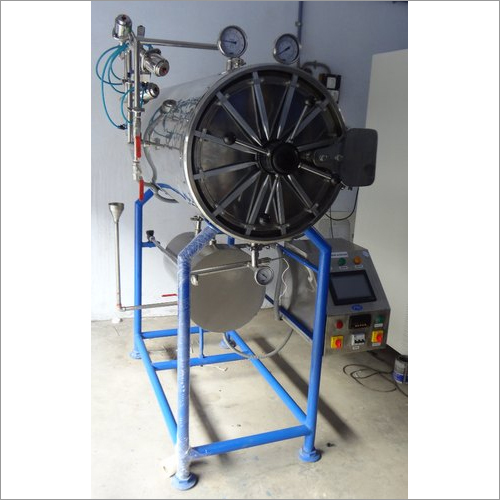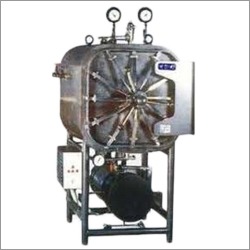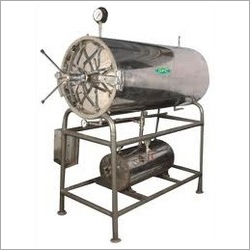Call Us
08045814219
SS Cylindrical Autoclave
250000 INR/Unit
Product Details:
- Material Complete S.S
- Chamber Size in Liter Capacity
- Click to view more
X
SS Cylindrical Autoclave Price And Quantity
- 1 Unit
- 250000 INR/Unit
SS Cylindrical Autoclave Product Specifications
- Complete S.S
- in Liter Capacity
SS Cylindrical Autoclave Trade Information
- 1 Unit Per Day
- 1 Days
Product Description
A stainless steel cylindrical autoclave is a specialized piece of equipment used in various industries, particularly in laboratories and medical facilities. Autoclaves are devices designed to sterilize equipment and supplies by subjecting them to high-pressure saturated steam at elevated temperatures. The use of stainless steel in the construction of autoclaves offers several advantages, such as corrosion resistance, durability, and ease of cleaning.
SS Cylindrical Autoclave Specifications:
1. Hydrotest Pressure: 35 psi
2. Size: 400x600-750x1200 mm
3. Model: PSI-026
4. Chamber Volume: 35-213 Litre
5. Material: Stainless Steel
6. Insulation Wall: Triple Wall
7. Automation Grade: Semi Automatic, Fully Automatic,Manual
8. Mount Type: Floor Mounted Autoclave
9. Approval Certificate: CE Certificate
10. Power Consumption: 2-6 KW
11. Temperature Range: 121.4 Degree Centigrade
12. Pressure Range: 15 psi
13. Installation: Yes
14. Voltage: 440 V AC
15. Phase: 3 Phase
Here are some key features and aspects of a stainless steel cylindrical autoclave:
1. Construction Material: Stainless Steel: Autoclaves are often constructed with stainless steel due to its resistance to corrosion and ability to withstand high temperatures and pressures. Common stainless steel grades used include 316 stainless steel, which is known for its corrosion resistance.
2. Cylindrical Design: Autoclaves typically have a cylindrical chamber, allowing for efficient distribution of heat and pressure. The cylindrical shape is chosen for its structural integrity and ease of manufacturing.
3. Sterilization Process: The autoclave sterilization process involves exposing materials to steam at high temperatures (usually around 121 to 134 degrees Celsius or 250 to 273 degrees Fahrenheit) under elevated pressure. This effectively kills bacteria, viruses, fungi, and other microorganisms, making it a crucial tool in laboratories, hospitals, and other settings where sterility is essential.
4. Control Systems: Modern autoclaves are equipped with sophisticated control systems that allow users to set and monitor temperature, pressure, and sterilization time. This ensures precise and reliable sterilization processes.
5. Safety Features: Autoclaves come with safety features such as pressure relief valves and locking mechanisms to prevent accidents. The design and construction adhere to safety standards to protect operators and ensure the integrity of the sterilization process.
6. Loading and Unloading: Autoclaves are designed for easy loading and unloading of materials. They typically have hinged doors with safety interlocks to prevent accidental opening during operation.
7. Maintenance and Cleaning: Stainless steel is easy to clean and maintain, making it suitable for autoclave construction. Regular maintenance and cleaning procedures are essential to ensure the longevity and proper functioning of the autoclave.
Applications of Stainless Steel Cylindrical Autoclave:
1. Laboratories: Microbiology Laboratories: Autoclaves are extensively used to sterilize culture media, glassware, pipettes, and other laboratory equipment.
Research Laboratories: Researchers sterilize instruments, media, and biological waste to maintain sterile conditions and prevent contamination.
2. Medical and Healthcare:
a. Hospitals and Clinics: Autoclaves are crucial for sterilizing surgical instruments, medical devices, and laboratory equipment to prevent the spread of infections.
b. Dental Clinics: Dental instruments and equipment are often sterilized in autoclaves to ensure aseptic conditions.
3. Pharmaceutical Manufacturing: Autoclaves play a vital role in the pharmaceutical industry by sterilizing production equipment, containers, and components to meet strict quality and regulatory standards.
4. Food Processing: In the food industry, autoclaves are used for sterilizing containers, packaging materials, and certain food products to extend shelf life and maintain product quality.
5. Veterinary Medicine: Veterinary clinics and research facilities use autoclaves to sterilize surgical instruments, laboratory equipment, and other tools to prevent the spread of infections among animals.
6. Biotechnology: Autoclaves are employed in biotechnological research and manufacturing processes to sterilize culture media, growth substrates, and equipment used in the production of biopharmaceuticals.
7. Waste Management: Autoclaves are used to sterilize biomedical waste, such as syringes, bandages, and other medical materials, before disposal to reduce the risk of contamination.
8. Academic Institutions: Universities and educational institutions use autoclaves in various departments, including biology, chemistry, and healthcare programs, for sterilizing laboratory equipment and materials.
9. Agricultural Research: Autoclaves are employed in agricultural research for sterilizing growth media, plant culture materials, and instruments used in plant pathology and genetics.
10. Cosmetic and Personal Care: Autoclaves may be used in the cosmetic and personal care industry to sterilize equipment and packaging materials to ensure product safety.
11. Quality Control and Testing Labs: Industries such as quality control and materials testing use autoclaves to sterilize equipment and ensure the reliability of test results.
Tell us about your requirement

Price:
Quantity
Select Unit
- 50
- 100
- 200
- 250
- 500
- 1000+
Additional detail
Mobile number
Email
Other Products in 'Laboratory Autoclaves' category
We are dealing only in North India (West Bengal, Andhra Pradesh, Bihar, Chandigarh, Chhattisgarh, Dadra and Nagar Haveli, Daman and Diu, Goa, Gujarat, Haryana, Madhya Pradesh, Maharashtra, Uttar Pradesh, Rajasthan, Uttarakhand)
.







 Call Me Free
Call Me Free
